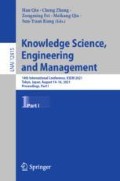Abstract
Few-shot relation classification is to classify novel relations having seen only a few training samples. We find it is unable to learn comprehensive relation features with information deficit caused by the scarcity of samples and lacking of significant distinguishing features. Existing methods ignore the latter problem. What’s worse, while there is a big difference between the source domain and the target domain, the generalization performance of existing methods is poor. And existing methods can not solve all these problems. In this paper, we propose a new model called Knowledge-based Diverse Feature Transformation Prototypical Network (KDFT-PN) for information deficit, lacking of significant distinguishing features and weak generalization ability. To increase semantic information, KDFT-PN introduces the information of knowledge base to fuse with the sample information. Meanwhile, we propose a novel Hierarchical Context Encoder based on prototypical network, which can enhance semantic interaction and improve cross-domain generalization ability. Moreover, this method has been evaluated on cross-domain and same-domain datasets. And experimental results are comparable with other state-of-the-art methods.
Access this chapter
Tax calculation will be finalised at checkout
Purchases are for personal use only
References
Cover, T., Hart, P.: Nearest neighbor pattern classification. IEEE Trans. Inf. Theory 13(1), 21–27 (1967)
Devlin, J., Chang, M.W., Lee, K., Toutanova, K.: Bert: pre-training of deep bidirectional transformers for language understanding, pp. 4171–4186 (2019). https://doi.org/10.18653/v1/N19-1423, https://www.aclweb.org/anthology/N19-1423
Fink, M.: Object classification from a single example utilizing class relevance metrics. In: Advances in Neural Information Processing Systems 2004, pp. 449–456 (2004). http://papers.nips.cc/paper/2576-object-classification-from-a-single-example-utilizing-class-relevance-metrics
Finn, C.: Model-agnostic meta-learning for fast adaptation of deep networks. In: Proceedings of the 34th International Conference on Machine Learning, vol. 70, pp. 1126–1135. PMLR (2017). http://proceedings.mlr.press/v70/finn17a.html
Gao, T.: FewRel 2.0: towards more challenging few-shot relation classification. In: Proceedings of the 2019 Conference on Empirical Methods in NLP, pp. 6250–6255. Association for Computational Linguistics (2019). https://doi.org/10.18653/v1/D19-1649, https://www.aclweb.org/anthology/D19-1649
Garcia, V., Bruna, J.: Few-shot learning with graph neural networks (2018). https://openreview.net/forum?id=BJj6qGbRW
Goodfellow, I.J., Shlens, J., Szegedy, C.: Explaining and harnessing adversarial examples. In: Computer Science (2014)
Han, X.: FewRel: a large-scale supervised few-shot relation classification dataset with state-of-the-art evaluation. In: Proceedings of the 2018 Conference on Empirical Methods in Natural Language Processing, pp. 4803–4809. Association for Computational Linguistics, Brussels (2018)
Li, F., Fergus, R., Perona, P.: One-shot learning of object categories. IEEE Trans. Pattern Anal. Mach. Intell. 28(4), 594–611 (2006). http://papers.nips.cc/paper/6996-prototypical-networks-for-few-shot-learning.pdf
Mintz, M.: Distant supervision for relation extraction without labeled data. In: Proceedings of the 47th Annual Meeting of the Association for Computational Linguistics and the 4th International Joint Conference on Natural Language Processing of the AFNLP (2009)
Mishra, N., Rohaninejad, M., Chen, X., Abbeel, P.: A simple neural attentive meta-learner. In: 6th International Conference on Learning Representations (2018). https://openreview.net/forum?id=B1DmUzWAW
Munkhdalai, T., Yu, H.: Meta networks (2017)
Pennington, J., Socher, R.: Glove: global vectors for word representation. In: Proceedings of the 2014 Conference on Empirical Methods in NLP (2014)
Satorras, V.G., Estrach, J.B.: Few-shot learning with graph neural networks. In: 6th International Conference on Learning Representations, ICLR 2018 (2018). https://openreview.net/forum?id=BJj6qGbRW
Snell, J., Swersky, K., Zemel, R.S.: Prototypical networks for few-shot learning. In: Advances in Neural Information Processing Systems, vol. 30 (2017)
Soares, L.B.: Matching the blanks: distributional similarity for relation learning. pp. 2895–2905. Association for Computational Linguistics (2019). https://doi.org/10.18653/v1/p19-1279
Surdeanu, M.: Multi-instance multi-label learning for relation extraction. In: Joint Conference on Empirical Methods in Natural Language Processing & Computational Natural Language Learning (2012)
Wang, Y.: Learning to decouple relations: few-shot relation classification with entity-guided attention and confusion-aware training (2020)
Zhou, P.: Attention-based bidirectional long short-term memory networks for relation classification (2016)
Acknowledgements
This research is supported by the National Key RD Program of China (No.2017YFC0820700, No.2018YFB1004700).
Author information
Authors and Affiliations
Corresponding author
Editor information
Editors and Affiliations
Rights and permissions
Copyright information
© 2021 Springer Nature Switzerland AG
About this paper
Cite this paper
Tang, Y. et al. (2021). Knowledge-Based Diverse Feature Transformation for Few-Shot Relation Classification. In: Qiu, H., Zhang, C., Fei, Z., Qiu, M., Kung, SY. (eds) Knowledge Science, Engineering and Management. KSEM 2021. Lecture Notes in Computer Science(), vol 12815. Springer, Cham. https://doi.org/10.1007/978-3-030-82136-4_9
Download citation
DOI: https://doi.org/10.1007/978-3-030-82136-4_9
Published:
Publisher Name: Springer, Cham
Print ISBN: 978-3-030-82135-7
Online ISBN: 978-3-030-82136-4
eBook Packages: Computer ScienceComputer Science (R0)

